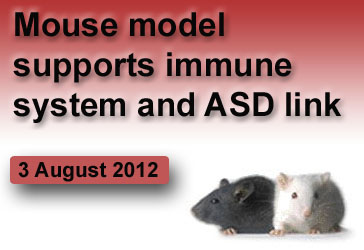Check out other stories from the Latest News
Maternal Infection May Lead to Autism, Immune Dysfunction
By Catherine Croft Swanwick, Ph.D. on August 3, 2012

Background: Maternal infection is a known risk factor for ASD. Various types of maternal infections associate with ASD according to different strengths of evidence: rubella strongly associates with ASD based on numerous scientific publications and animal models, influenza moderately associates with ASD due to conflicting results, and cytomegalovirus weakly associates with ASD with reports from <10 scientific papers.
In order to generate mice displaying ASD symptoms, scientists can mimic maternal infection by activating the immune system of their pregnant mothers. This maternal immune activation (MIA) model is often used to explore neurobiological mechanisms underlying ASD.
What’s New: Scientists used the maternal infection model of ASD (also known as the MIA model) to examine the role of the immune system in ASD. In addition to exhibiting ASD symptoms, mice born to MIA mothers showed problems with their immune systems. Bone marrow transplants from healthy mice both 1) restored their immune system function and 2) reduced ASD symptoms such as repetitive and anxiety-like behaviors.
Why it’s Important: This evidence suggests a link between the immune system and ASD behaviors. Many humans with ASD also possess immune system problems. Future research will most likely focus on the role of the immune system in ASD and whether immunological treatments will help reduce ASD symptoms.
Help me understand :
| Source(s) : |
| Tweet |

